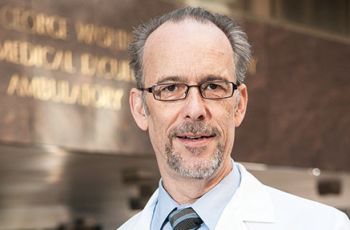
For more than 70 years, the James D. Bruce Memorial Award for Distinguished Contributions in Preventive Medicine has been presented by the American College of Physicians (ACP) for distinguished contributions in preventative medicine. In 2019, George Washington University’s (GW) Lawrence “Bopper” Deyton, MD ’85, MSPH, joined the elite list of award winners.
"It’s an honor to be nominated for and to receive this award from the American College of Physicians. It’s such a historic and recognized award, and to be included in a list of people who are revered in the public health world is really humbling,” says Deyton, senior associate dean for clinical public health, Murdock Head Professor of Medicine and Health Policy, and professor of medicine at the GW School of Medicine and Health Sciences (SMHS).
Deyton will receive the award, established in 1946 to honor Bruce, MD, a former president of the ACP, at a convocation ceremony on April 11 in Philadelphia during the college’s annual meeting. Former awardees includes greats such as polio vaccine inventor Jonas Salk; Surgeon General Luther Terry, who issued the first Surgeon General’s Report on Smoking, and Health; and Donald Henderson, who eradicated small pox throughout the world.
Deyton held leadership positions at the National Institute of Allergy and Infectious Diseases at the National Institutes of Health (NIH) for more than a decade, and served as the chief public health and environmental hazards officer for the U.S. Department of Veterans Affairs’ Veterans Health Administration. In addition, in the 1970s he co-founded the Whitman-Walker Clinic in Washington, D.C.
He served as the first director of the Center for Tobacco Products at the U.S. Food and Drug Administration (FDA). While there, Deyton led the creation of the science, regulatory, and enforcement foundation for implementing the Family Smoking Prevention and Tobacco Control Act, which was signed into law by President Barack Obama in 2009.
“There were fundamental changes that happened because of that law protecting children and teens from using tobacco products,” Deyton noted. “We issued new federal regulations that restricted the sale of cigarettes to anyone under the age of 18 and we put an enforcement program in place.”
He added that for the first time, the FDA was able to educate the public about the true harms of tobacco use, including prohibiting language in marketing and on cigarette packages that misled consumers into believing that a certain cigarette brand was safer without any proof.
“We also, for the first time, required tobacco companies to submit to the FDA lists of the harmful ingredients in the cigarettes and how much of each one, which was never before reported,” he added, “and also laid the groundwork for regulating smokeless tobacco and e-cigarettes.”
During his time at the NIH, Deyton worked in finding medicines to treat HIV infection.
“I was lucky to help be able to help create and steer many of the early clinical trial efforts funded by NIH to develop drugs and strategies to treat HIV infection. This was a large part of the research that transformed HIV from a uniformly fatal disease to a manageable chronic condition today,” he said.
Deyton said he hopes his work in prevention, research, and public service might be an example for students at SMHS, so they see the role they can have in tackling the thorny public health issues of today. “I would encourage any student any trainee in any of our programs to dedicate their work to prevent and cure these public health problems,” he said. “More than anything, I hope this recognition and the work that I was lucky enough to get to do will show our students and trainees that anyone can do this and everybody has a role to play to in solving these important public health problems.


